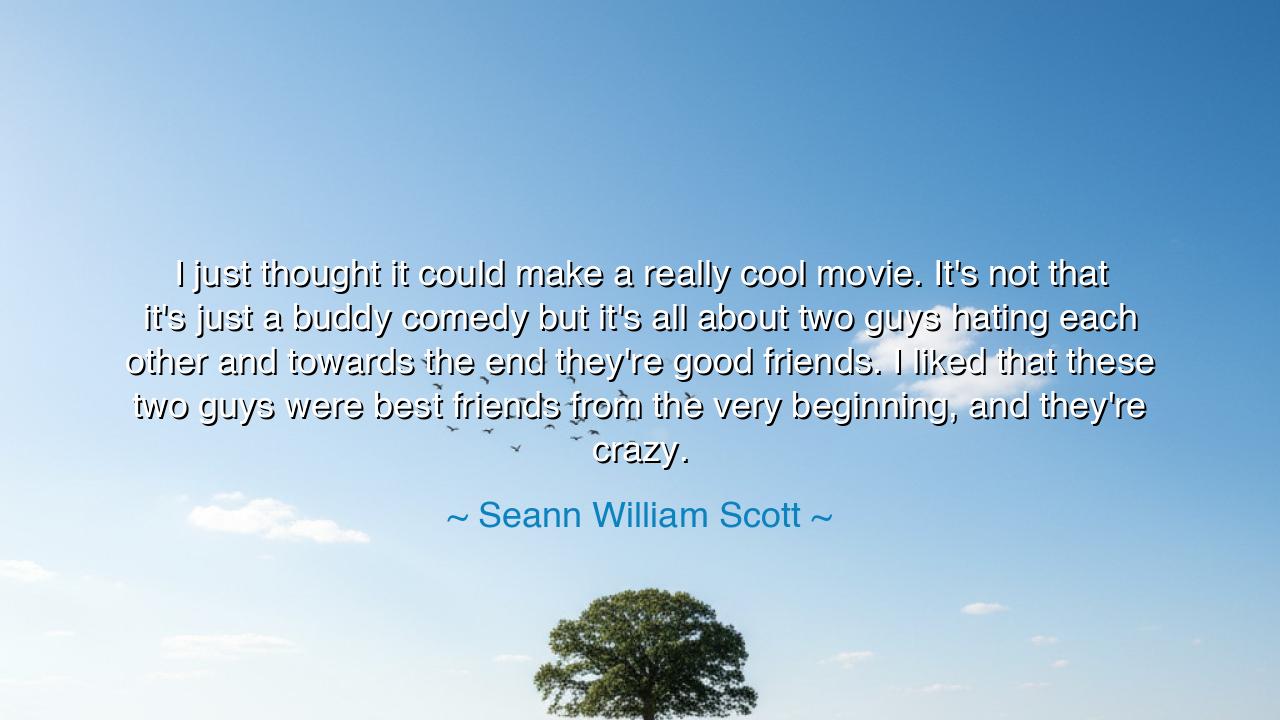
I just thought it could make a really cool movie. It's not that
I just thought it could make a really cool movie. It's not that it's just a buddy comedy but it's all about two guys hating each other and towards the end they're good friends. I liked that these two guys were best friends from the very beginning, and they're crazy.






On the Brotherhood Forged in Struggle and the Madness of Friendship
When Seann William Scott said, “I just thought it could make a really cool movie. It’s not that it’s just a buddy comedy but it’s all about two guys hating each other and towards the end they’re good friends. I liked that these two guys were best friends from the very beginning, and they’re crazy,” he spoke with the voice of one who has glimpsed a timeless truth hidden beneath laughter — that friendship, true and unbreakable, is often born from conflict, sharpened by misunderstanding, and redeemed through loyalty. His words, though spoken of film and story, reach beyond the screen; they speak of the human heart’s wild path toward connection, and how even chaos can give birth to love between souls.
At first, he describes what seems ordinary — a tale of two men who begin in hatred and end in friendship. Yet within this arc lies the secret pattern of all great relationships. The ancients knew this: that only through friction is the bond of brotherhood tested and strengthened. The “two guys hating each other” are not simply enemies; they are mirrors, each reflecting the other’s flaws, pride, and fear. Their hatred is the fire in which their humility is forged. By the end, when they emerge as friends, it is not because the story forced it — it is because they have been transformed. What began in rivalry ends in recognition, and recognition is the highest form of love.
When Scott says, “I liked that these two guys were best friends from the very beginning,” he reveals a paradox as old as myth — that sometimes, the soul knows before the mind does. In the clamor of conflict, beneath the noise of pride and misunderstanding, a hidden truth hums: these two are kindred spirits. The madness he speaks of — their “crazy” nature — is not mere chaos but the unguarded, untamed energy of authenticity. For friendship without madness is like a fire without warmth; it burns, but it does not glow. True companions are rarely calm together. They argue, they jest, they stumble through storms — and yet, when the dust settles, they stand side by side, bound by the unspoken vow that neither will abandon the other.
History offers countless echoes of this truth. Consider Achilles and Patroclus, whose bond in The Iliad was born from the battlefield — one proud, one patient, both drawn to each other’s strength. Or Alexander the Great and Hephaestion, who quarreled fiercely, yet shared a devotion that outlived nations. Even Mark Antony and Julius Caesar, bound in friendship and ambition, reveal that such ties are not always calm but always profound. Conflict does not destroy true friendship; it proves it. For the ones we fight most passionately are often the ones we care for most deeply — those whose presence shapes us, challenges us, and calls forth our better selves.
In Scott’s words, we also hear an artist’s intuition — that stories of companionship are not simple tales, but reflections of the sacred human need to belong. To watch two people transform from foes to friends is to see the possibility of redemption in ourselves. It reminds us that bitterness can yield to laughter, that walls can become bridges, and that even in madness there is a strange kind of wisdom. The “cool movie” he imagines is not merely entertainment; it is a parable for life, disguised as comedy.
The deeper wisdom lies in understanding that friendship, like art, must embrace imperfection. The best friends are “crazy”, not because they are reckless, but because they dare to live honestly before one another — to speak without masks, to argue without fear, to forgive without pride. In a world obsessed with decorum and distance, such relationships are rare and precious. They remind us that love, whether between friends or lovers, is not polite — it is alive. It shakes the soul, breaks the ego, and builds something stronger in its wake.
The lesson, then, is this: seek the friendships that challenge you, not just the ones that comfort you. Do not flee from the companions who argue, who mirror your flaws, who drive you mad — for they may be the very ones who refine your spirit. In life, as in the stories of the screen, the path from conflict to camaraderie is the journey of growth. Cherish the madness of friendship, for within it lies the beauty of being fully human.
Thus, the simple reflection of Seann William Scott becomes a teaching for all ages: that laughter, conflict, and chaos are the instruments through which loyalty is composed. From the friction of difference comes the light of understanding; from the storm of pride comes the calm of trust. And in the end, when the credits of life roll on, it is our crazy, loyal friends who stand beside us — the ones who once drove us wild, yet now define who we are.






AAdministratorAdministrator
Welcome, honored guests. Please leave a comment, we will respond soon